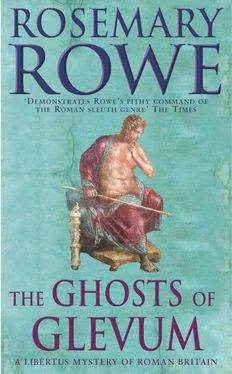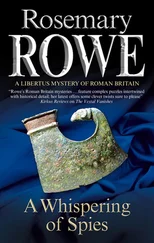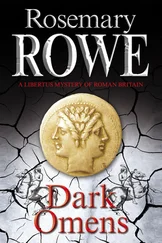Rosemary Rowe - The Ghosts of Glevum
Здесь есть возможность читать онлайн «Rosemary Rowe - The Ghosts of Glevum» весь текст электронной книги совершенно бесплатно (целиком полную версию без сокращений). В некоторых случаях можно слушать аудио, скачать через торрент в формате fb2 и присутствует краткое содержание. Год выпуска: 2013, ISBN: 2013, Издательство: Headline, Жанр: Исторический детектив, на английском языке. Описание произведения, (предисловие) а так же отзывы посетителей доступны на портале библиотеки ЛибКат.
- Название:The Ghosts of Glevum
- Автор:
- Издательство:Headline
- Жанр:
- Год:2013
- ISBN:9781472205100
- Рейтинг книги:3 / 5. Голосов: 1
-
Избранное:Добавить в избранное
- Отзывы:
-
Ваша оценка:
- 60
- 1
- 2
- 3
- 4
- 5
The Ghosts of Glevum: краткое содержание, описание и аннотация
Предлагаем к чтению аннотацию, описание, краткое содержание или предисловие (зависит от того, что написал сам автор книги «The Ghosts of Glevum»). Если вы не нашли необходимую информацию о книге — напишите в комментариях, мы постараемся отыскать её.
The Ghosts of Glevum — читать онлайн бесплатно полную книгу (весь текст) целиком
Ниже представлен текст книги, разбитый по страницам. Система сохранения места последней прочитанной страницы, позволяет с удобством читать онлайн бесплатно книгу «The Ghosts of Glevum», без необходимости каждый раз заново искать на чём Вы остановились. Поставьте закладку, и сможете в любой момент перейти на страницу, на которой закончили чтение.
Интервал:
Закладка:
I shook my head. The chances were the slave in question was in custody, being interrogated by other men — and no doubt by other methods. If there was anything to learn, the authorities were probably aware of it by now. But I persisted all the same. ‘Did you see anything in the corridor, or court? Anything at all unusual? Think carefully before you answer me.’
He shook his head. ‘Nothing. Not even servants from the dining room carrying wine and dishes to and fro — except the one who was accompanying me. He took me to the slave’s room to collect my coat, and when he picked me up again I noticed he had a plate of something in his hand. Oh, and there was a little bucket-boy as well, waiting outside the vomitorium: he seemed to be in trouble of some kind when I looked back into the court.’
I had difficulty keeping the excitement from my voice. ‘You came back to the court?’
He shrugged. ‘Not exactly. I intended to. The doorkeeper had been told to let me out, but I was so enraged at being hustled off halfway through my piece, without even being paid, that I asked the man to wait, intending to burst in on His Excellence and simply demand the money that was due. But as soon as I put my head round the colonnade and heard what was going on in the court I changed my mind and left.’
‘What was going on?’
‘The bucket-boy was being scolded for his idleness and ordered to clean the place at once, on pain of being whipped, because the feast would soon be over and the guests would want to visit the vomitorium again before they left for home. It all seemed very harsh to me — and quite unjustified. The room looked perfectly all right. But apparently his owner was seriously displeased.’
I found that I was standing like a statue, holding my breath. ‘Go on.’
‘It was all done very quietly, of course, so as not to disturb the guests, but sound always carries in a colonnade, especially a savage hiss like that, and obviously I could not help but overhear. Anyway, the lad got a savage cuff round the ear and was sent off to fill his bucket from a spring, which I gathered was outside in the grounds somewhere — without a torch-brand too, though it was clearly very cold and dark out there. I realised that if Marcus Septimus was in a mood like that, it obviously wasn’t a good moment to insist on being paid, so I slipped back to the doorkeeper at once, said I’d thought better of my plan and disappeared before the bucket-boy came back. The doorman had me in his sight throughout — as I’m sure he could testify. I had no opportunity to murder anyone.’
I nodded. ‘So who was hissing at the bucket-boy? A slave? Could you identify him again?’
‘Of course I could. It was the same slave that had shown me out. The one they call Umbris. He seemed to be in charge of everything. You must have noticed him.’
I breathed out slowly and let this sink in, remembering what Golbo had said. It tallied perfectly. Umbris sent Golbo from the court, apparently on Marcus’s command, at a moment of extreme convenience for anyone who had poisoned Praxus’s meal and expected him to stagger out and die. If Marcus hadn’t ordered that, who had? The slave could have no motive of his own, far less the money to buy poison with. Yet who else would Umbris take instruction from?
There was one obvious candidate, of course, suggested by something in Loquex’s narrative which had struck me forcibly. I asked, with a pretence at casualness, ‘Umbris talked about his “owner” ordering all this? He didn’t say “the master” — you are sure of that?’ Golbo, I remembered, had used the same word.
Loquex looked bewildered, but he answered instantly. ‘As I remember, citizen, “our owner” is what he said. Does it matter?’
‘I don’t know,’ I said. I meant it. Of course, there was nothing remarkable in the choice of word itself: ‘owner’ is interchangeable with ‘master’ in most instances. But what of the mistress of the house? Julia was owner, but not master, of the slaves. She had loathed Praxus for his sexual overtures to her — could she have taken this revenge on him? She was in the house throughout with access to the kitchens day and night, and so had every chance to slip something into wine or food — and to ensure it reached the proper guest. After the murder she was soon upon the scene. Suspiciously quickly, when one thought about the facts. Suppose she had instructed Umbris to send the bucket-boy away, because she knew that Praxus had eaten poisoned food and would very soon be struggling out to die in a way that — given the amount he drank — would hardly seem suspicious in the least.
The more I thought of this, the more unfortunately possible it seemed. The servants would obey Julia’s orders instantly, as unquestioningly as they would obey Marcus’s own. They would protect her too, I thought suddenly. If Golbo suddenly had guessed that she had sent the order which removed him from the court, it might account for why he had changed his mind and run away. Could it even have been one of Julia’s slaves who’d found Golbo in my dye-house on that fateful night, and silenced him in order to protect his mistress’s name? Cilla had left the villa, as I knew. Would that explain why he had looked surprised, and not attempted to defend himself?
And what about that treasonable document? Julia was capable of scheming — she’d proved as much today — and she had ‘co-operated’ with the search which had disclosed that letter in his study. Had she written it and put it there for them to find? It was possible that she had used her husband’s seal — Marcus wore his seal-ring every day, but it was likely that he took it off at night. Julia had more chance than anyone of using it, if she intended to discredit him. But why? Simply to draw suspicion from herself, because she’d murdered Praxus, and I had foolishly pointed out that his death was no mere accident?
But that made no sense, I realised with relief. Marcus was wearing the seal-ring when he was arrested, so Julia could not have used it later on to save herself. Nor could she have composed a convincing document: her grammar was erratic and she did not form her letters in the standard Roman army way, as Marcus and most educated writers did. That whole theory was impossible. I was creating illusions in the smoke like a Sibylline prophetess. Besides, although I could accept that Julia might wish pawing Praxus dead, I did not believe that she’d betray her husband and her child. I could more easily accept that Marcus had done the deed himself and written that incriminating letter too, trusting in the priest of Jupiter’s prophecy and hoping to hasten the day when Pertinax would be Emperor of Rome. I shook my head.
The old poet was looking at me anxiously. ‘I assure you, citizen. .’
‘It’s all right, Loquex,’ I said distractedly, handing him the coins. ‘I don’t doubt your word.’
He seized the money. ‘Thank you, citizen.’ Then, with a gleeful smile: ‘I can’t go until that fisherman comes back to guide me home. Would you like to hear my eulogy again?’
Since I did not know my own way back across the marsh, I really had very little choice. We had worked our way through the thing again, right down to the final verse about
‘Libertus is a citizen, a mosaicist by trade
Who oftentimes has come to his good patron’s aid’
before Tullio arrived to rescue me.
XXIV
Sosso was waiting when we reached the little roundhouse in the reeds. He looked so pleased and cunning, squatting in the smoky firelight beside the central hearth, that I felt my heart begin to stir with hope.
‘You have something for me?’ I demanded.
Sosso looked warningly towards the woman and the boys, and jerked a thumb in the direction of the door. All of them instantly withdrew.
Читать дальшеИнтервал:
Закладка:
Похожие книги на «The Ghosts of Glevum»
Представляем Вашему вниманию похожие книги на «The Ghosts of Glevum» списком для выбора. Мы отобрали схожую по названию и смыслу литературу в надежде предоставить читателям больше вариантов отыскать новые, интересные, ещё непрочитанные произведения.
Обсуждение, отзывы о книге «The Ghosts of Glevum» и просто собственные мнения читателей. Оставьте ваши комментарии, напишите, что Вы думаете о произведении, его смысле или главных героях. Укажите что конкретно понравилось, а что нет, и почему Вы так считаете.












